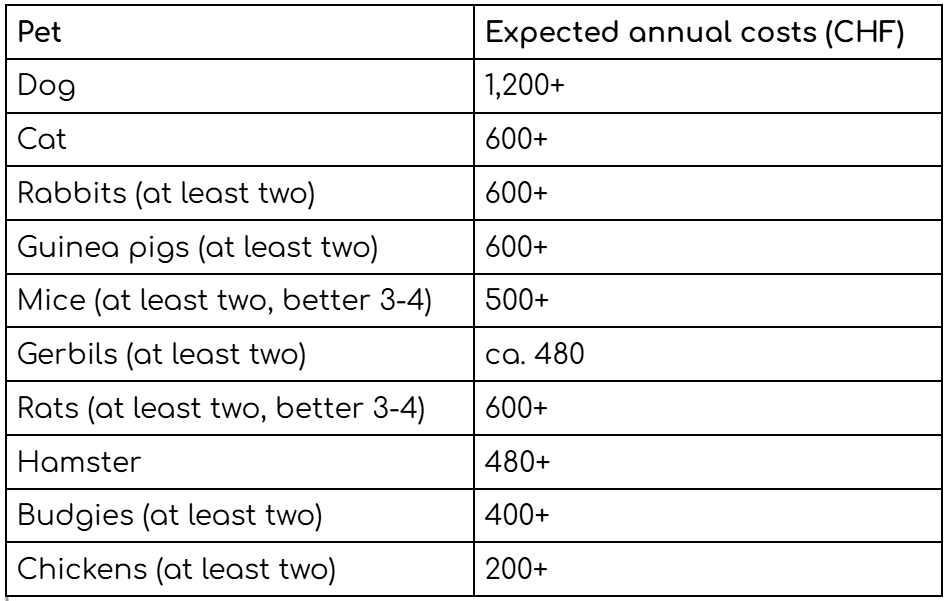Pets in Switzerland: What Are the Rules and Laws?
Around 43% of Swiss households have a pet. Dogs and cats are the most popular choices, but many people also keep rodents, birds, or even reptiles. So, what are the rules and laws regarding pets in Switzerland? And can you keep a pet in a rental apartment?

Keeping Pets in Switzerland: General Animal Welfare Rules
Switzerland has two sets of laws that regulate the keeping of pets: the Swiss Animal Welfare Act and the Animal Protection Ordinance. These laws are designed to maintain the welfare and dignity of the animal. Some of the most important ones are:
- Social animals, like guinea pigs, rats, mice, parrots, and canaries, cannot be kept alone. You must keep at least two of these animals together.
- Dogs with docked tails or ears are not allowed in Switzerland. Dogs like Schnauzers, Boxers, and Doberman Pinschers sometimes have their ears and tails docked.
- Every dog must be microchipped. It is also recommended that cats be microchipped.
- Dogs need daily contact with humans and, ideally, other dogs.
- Cats can be kept indoors alone, but they need regular contact with humans.
- It is illegal to remove cats’ claws.
Importing Pets
You can often take your pets with you when you move to Switzerland. However, the process varies significantly depending on where your pets are from. If you’re flying to Switzerland, your pets may require special cages, and you may pay a travel fee.
Your pets are also likely to need a pet passport, a microchip, and a rabies vaccination. There may be a veterinary check before the pets are admitted into the country, and you will need to complete at least one form. Depending on the species and where you’re travelling from, there could be other requirements, such as an import permit. It’s always best to check the regulations for your specific country and pet(s). The Swiss government’s interactive entry check page is a good starting point.
Travelling with Pets
If you live abroad and you want to travel to Switzerland temporarily, the pet import rules detailed above are likely to still apply. Your pet will need an animal passport, a microchip or tattoo, and a rabies vaccination.
Once you’re in Switzerland, you can travel freely with your pets, as long as they are properly contained. For example, cats should be in a cat carrier on trains or buses. Dogs larger than 30cm and/or not contained in a dog carrier require a second-class half-fare train ticket. There are also day, monthly, and annual travel cards for dogs.
If you live in Switzerland and want to travel abroad with dogs, cats, or ferrets, every animal will need a passport, a microchip, and a rabies vaccination. Always check the destination’s regulations before you travel.
Lost and Found Pets
There are comprehensive rules for what happens to lost and found pets in Switzerland. If you’ve lost your pet, the first thing to do is to report it to the STMZ (Swiss animal reporting centre) and check their listings. Almost all shelters and many individuals list found animals on STMZ. You can also contact your local or cantonal animal shelter, as the finder might have brought the animal there.
Found pets should be registered with STMZ, so they can be reunited with their owners ASAP. Then, they should be brought to the cantonal or local animal shelter. There is a legal holding period of two months. After that, unclaimed pets can be given up for adoption.
Specific Rules for Dogs
Your dog must be microchipped and registered in the Amicus database, and you must pay an annual dog tax. This varies by canton, but it usually costs CHF 100-200 annually. You also have to allow your dog to exercise every day, either by providing it with a garden or by taking it outside. If you tie up your dog, it must have a roaming area of at least 20 square metres. Harsh training methods, like using spike collars or firing shots to punish a dog, are not allowed. There are often additional cantonal regulations. For example, pit bulls and other potentially dangerous dogs are not allowed in several cantons like Fribourg and Zurich.
Specific Rules for Cats
There is no cat tax, and microchipping your cat is optional. However, registering your cat in the Anis database can make it easier for the animal to be identified if it gets lost.
Like dogs, cats have to be kept according to their needs. You must provide regular daily contact with humans and ideally with other cats. If your cat lives indoors, provide climbing and play opportunities. It’s illegal to keep your cat in a cage permanently. Castration isn’t mandatory, but it’s recommended as cats can have up to three litters a year.
 If your cat lives indoors, you must provide it with appropriate climbing and play opportunities.
If your cat lives indoors, you must provide it with appropriate climbing and play opportunities.
Rules for Other Pets and Captive Animals
Aside from the well-known rule that stipulates you can’t keep social animals alone, there are separate laws regulating the type of enclosure each species can be kept in. You may need to provide a certain amount of space per animal, climbing opportunities, structures for hiding, and/or digging opportunities. Remember to check the Swiss government’s guidelines as well as the local laws in your canton.
How Much Does a Pet Cost in Switzerland?
The cost of keeping pets in Switzerland depends on the species and the individual animal’s needs. Typically, dogs are the most expensive to keep. The typical costs associated with dog ownership are:
- An annual dog ownership tax
- Personal liability insurance
- Food
- Annual vet costs (and/or health insurance for your dog)
When you first get your dog, you may also need to pay up to CHF 1,000 for microchipping, spaying or neutering, vaccinations, and items such as toys, leashes, litter boxes, and food and water bowls.
Cats and other small animals are somewhat more affordable as you don’t need to pay tax or personal liability insurance. However, vet costs can still be expensive, so health insurance might make sense.
Additional Costs
Follow the national and local pet ownership laws to avoid additional costs. For example, you could be fined if you fail to pick up after your dog or walk it without a leash where it’s not allowed.
 Source: Zürcher Tierschutz (Zurich Animal Protection Association)
Source: Zürcher Tierschutz (Zurich Animal Protection Association)
Renting with Pets
Renting with pets in Switzerland is often possible, but it depends on your tenancy agreement. There are three possible situations:
- There is no provision for pets in the agreement: In this case, pets are allowed, as long as they don’t disturb or endanger the other residents in the building.
- The keeping of pets is dependent on the landlord: You can only keep pets if the landlord agrees. If you already have a pet, you should discuss this with the landlord before you sign the agreement. If you want to get a new pet, you must let your landlord know ahead of time.
- Pets are prohibited: In this case, you’re not allowed to keep pets. Although you can ask for an exception, your landlord has the right to refuse.
Although these rules apply to most pets, certain species are considered unproblematic. They are allowed even if other pets are prohibited in an apartment. Examples are guinea pigs, hamsters, ornamental fish, and budgerigars. They must be kept contained and in reasonable numbers.
The welfare of animals is a priority in Switzerland. For this reason, there are well-defined laws for keeping pets in Switzerland However, this doesn’t mean you can’t import your pets or buy new ones as an expat. As long as you follow the Swiss government’s guidelines, you can keep cats, dogs, rodents, birds, and even exotic animals. Download our comprehensive Rigby AG ebook to find out more about life in Switzerland.